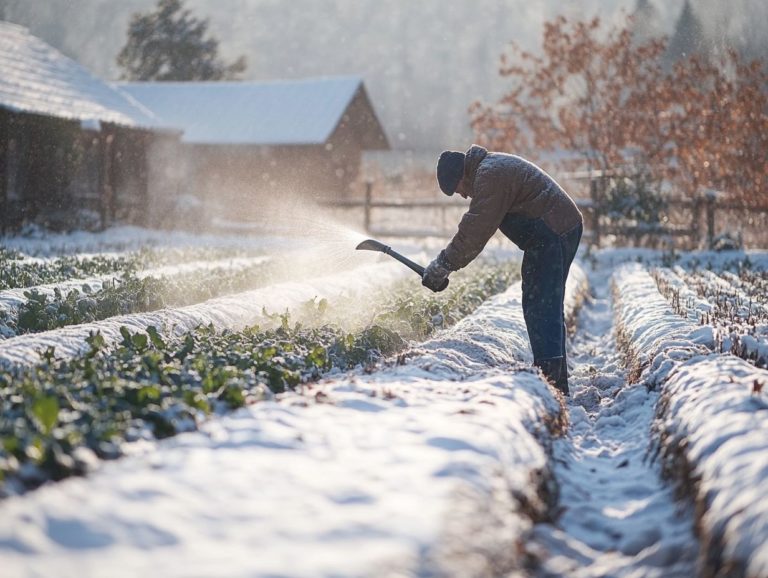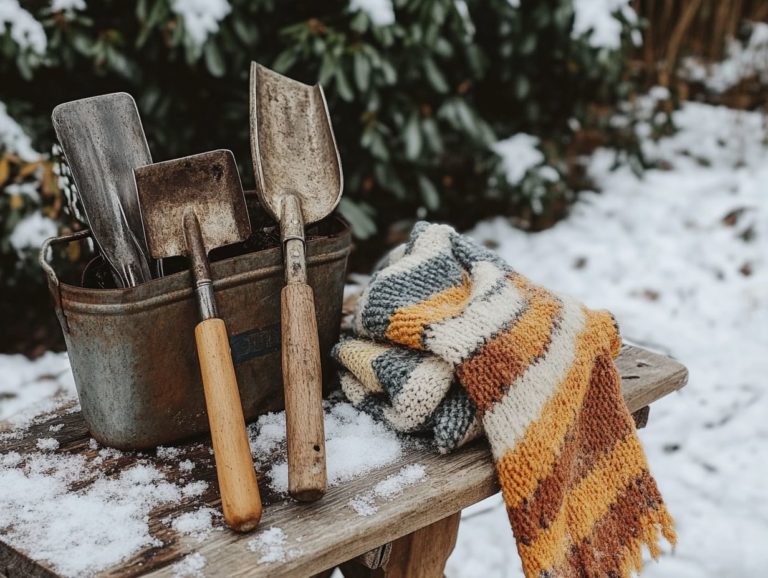How to Grow Winter Herbs Successfully
Winter might seem like an odd time for gardening. But growing winter herbs and perennial herbs can add vibrant flavors to your kitchen and garden.
Explore the many benefits of these tough plants. From health perks to culinary delights, you ll discover how to choose the right herbs and prepare your garden.
Learn the best ways to harvest and store your herbs for maximum flavor. Embrace the winter gardening season like never before!
Contents
Key Takeaways:
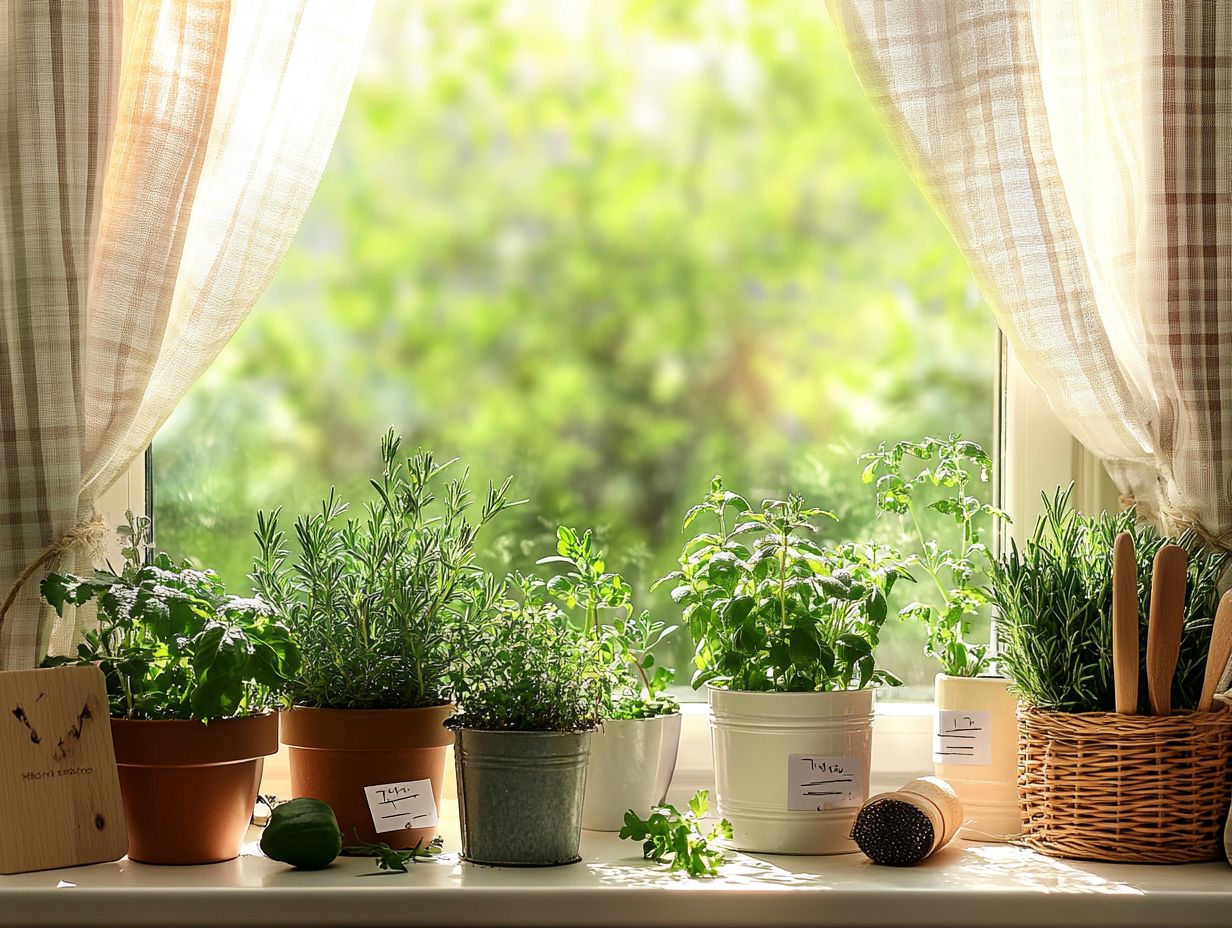
What are Winter Herbs?
Winter herbs thrive in cooler temperatures and are a must-have for anyone wanting to enjoy fresh herbs in winter. Understanding how well plants survive the cold, along with tips for growing mushrooms in winter, is key. This knowledge ensures that your culinary and medicinal herbs can brave the winter chill, ultimately enhancing your gardening experience and increasing your yield.
These hardy plants not only withstand frost but also present a unique array of flavors and healing properties, enriching both your kitchen and medicine cabinet. Popular options like thyme, rosemary, and sage tolerate low temperatures, making them ideal for various gardening scenarios. For example, thyme deepens the flavor of your dishes and possesses antiseptic qualities, while fragrant rosemary is versatile for countless recipes and offers anti-inflammatory benefits.
Understanding overwinter herbs and winterizing herbs gives you the power to cultivate a sustainable landscape that remains productive, even in harsh conditions.
Benefits of Growing Winter Herbs
Growing winter herbs offers great rewards. They boost your gardening experience and add flavors to your winter meals. These hardy plants infuse your dishes with fresh flavors during the chillier months and play a crucial role in effective herb maintenance. By incorporating winter herbs into your gardening strategy, your herb garden flourishes year-round.
Health and Culinary Advantages
Winter herbs pack a punch in flavors and nutrients. Adding herbs like rosemary, thyme, and parsley to your meals can improve your health while enhancing taste. Take rosemary, for instance. This herb is celebrated for its potent antioxidant properties and is abundant in vitamins A, C, and B6, which can bolster your immune function and improve digestion.
Then there s thyme, which brings its own set of benefits with antimicrobial qualities and high vitamin K content, promoting your cardiovascular health.
But these herbs are not just garnishes; they can be infused into oils, tossed into hearty winter soups, or crafted into aromatic marinades. Use these herbs to create delicious meals. Try this: saut garlic and oregano in olive oil, then add roasted vegetables for a comforting dish.
Choosing the Right Winter Herbs to Grow
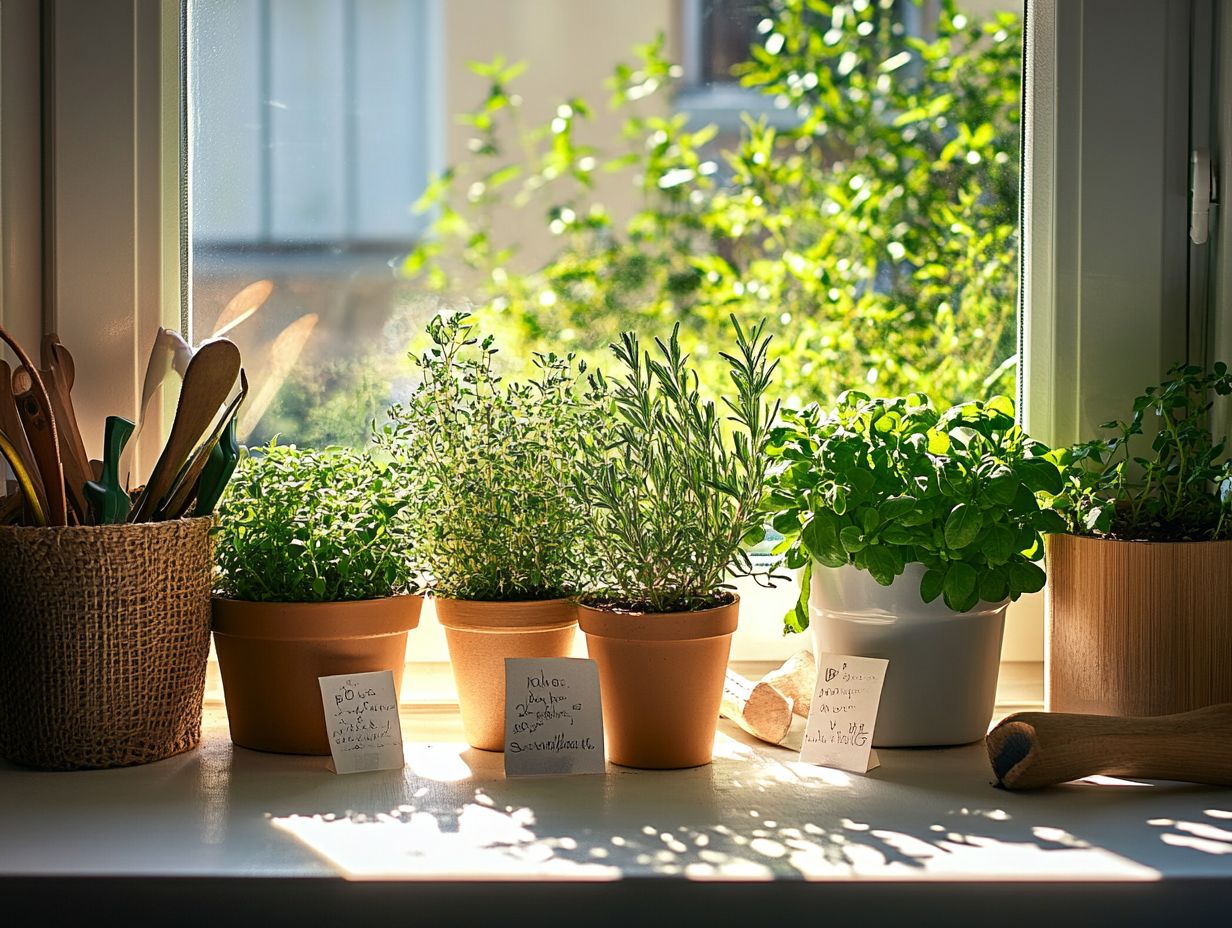
Selecting the right winter herbs for your garden is essential in unlocking its full potential, especially when considering your specific USDA growing zone, which helps you know what plants can thrive in your area, and local climate conditions.
By grasping the cold hardiness of various herb varieties and their suitability for container gardening, you empower yourself to make informed choices that will guarantee your winter herbs not only survive but flourish throughout the season.
Recommended Varieties and Uses
When it comes to winter herbs, you have a wealth of options at your fingertips. Each has unique characteristics and uses that cater to your culinary and medicinal needs.
From the robust flavor of rosemary to the refreshing notes of mint, choosing the right herb varieties for your garden can significantly elevate your cooking, health, and overall gardening experience.
Herbs like thyme and sage thrive during the colder months, offering aromatic profiles that enhance a wide array of dishes.
Thyme, with its earthy and slightly floral flavor, is perfect for seasoning everything from roasted vegetables to hearty stews. Meanwhile, sage brings a savory richness that complements meats and adds a distinct edge to classic comfort foods.
These herbs also possess valuable medicinal properties. For instance, cilantro and thyme have antiseptic qualities, while sage supports digestion.
To prolong their shelf life, consider drying or freezing these herbs. This ensures they retain their vibrant flavors and health benefits throughout the year.
Preparing for Winter Herb Gardening
Get ready to dive into winter herb gardening! It s all about protecting your plants as temperatures drop.
Essential gardening tips for seasonal gardening include:
- Establishing a proper mulch layer
- Selecting the right supplies
- Thoughtfully planning your herb garden layout
This approach enhances resilience during the colder months.
Essential Supplies and Tools
To successfully grow winter herbs, having the right essential supplies and tools is crucial. For a more comprehensive understanding, check out this guide on how to grow a winter salad garden, as these tips can greatly enhance your herb gardening experience.
From high-quality pots designed for container herbs to specialized garden tools that simplify pruning and caring for your plants, preparing in advance can save you time and elevate your yields.
Equipping yourself with the right supplies not only streamlines your daily tasks but also promotes healthier plants.
For indoor gardens, consider investing in self-watering pots that maintain consistent moisture levels, while outdoor gardeners should opt for frost-resistant containers that can brave the winter chill.
Essential tools, like ergonomic pruners for pruning herbs, will make trimming your herbs a breeze. A quality watering can with a tapered spout allows for precise watering without over-saturating the soil.
Incorporating organic fertilizer into your routine can further enhance the vitality of your herbs, ensuring they thrive even in the colder months.
Planting and Caring for Winter Herbs
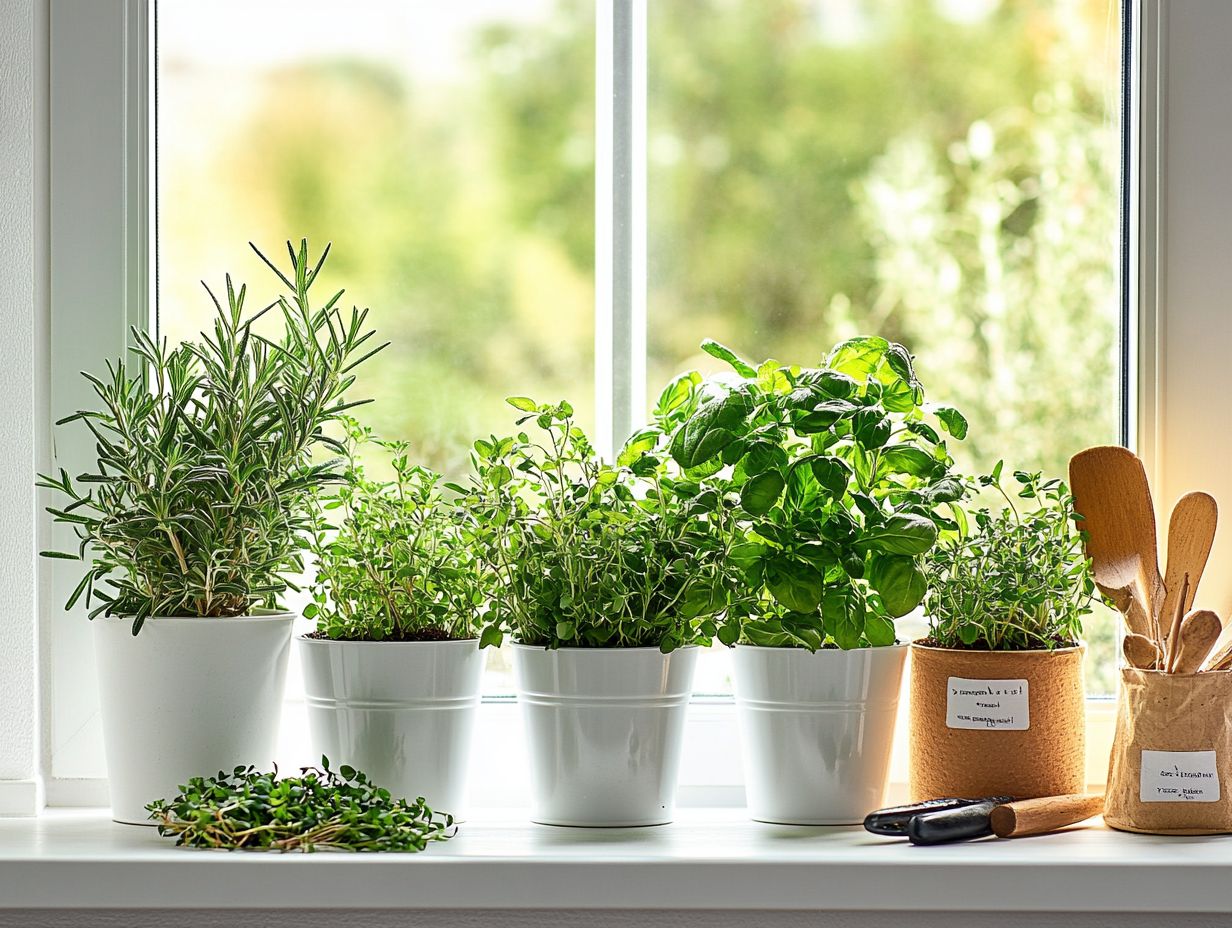
Planting and nurturing winter herbs demands particular gardening methods that enable these resilient plants to flourish, even in the chill of winter. For more information, check out these tips for sustainable winter gardening.
By mastering the art of planting, watering, and maintaining your herbs, you empower yourself to cultivate a thriving herb garden filled with tender perennials that consistently delivers fresh flavors throughout the colder months.
Step-by-Step Guide and Tips
A simple method will set you up for success in planting and caring for winter herbs. This guide offers helpful tips for growing microgreens in winter, allowing you to enjoy fresh herbs throughout the winter. By systematically planting, watering, and maintaining your herbs, you can benefit in both culinary and medicinal pursuits.
Start by selecting a variety of herbs that thrive in cold weather, such as Thyme, Rosemary, and Parsley. These herbs enhance the flavor of your dishes and withstand frosty conditions. To successfully grow them, consider overcoming winter gardening challenges by choosing containers with excellent drainage to avoid water accumulation, which can lead to root rot, a plant disease caused by excess water. Water your herbs sparingly yet consistently, keeping the specific needs of each variety in mind.
Regular inspections are vital. Check your indoor herb garden for pests and diseases. By adjusting care routines according to weather changes and growth patterns, you’ll foster resilience in your plants, ensuring they remain healthy and vibrant throughout the winter months, supported by winter protection.
Harvesting and Storing Winter Herbs
Harvesting and storing winter herbs with care is crucial for maximizing their flavor and shelf life. This enables you to savor their benefits long after the growing season, enhancing your dishes with fresh flavors.
By mastering the right techniques for both harvesting and storing, including drying and freezing, you can significantly elevate your culinary experiences, ensuring that their distinctive flavors remain intact.
Proper Techniques for Maximum Flavor and Shelf Life
Use proper harvesting and storage techniques to keep your herbs fresh. From the timing of your harvest to the methods of storage, every step is crucial for retaining the freshness and potency of these delightful herbs.
Understanding when to snip those leafy greens is vital. The ideal time for harvesting is typically in the morning after the dew has dried but before the sun hits its peak. This timing often results in herbs that are more aromatic and flavorful. Use sharp, clean scissors or pruning shears to make a healthy cut, supporting the plant’s continued growth.
For storage, keep your herbs in a cool, dark place, avoiding moisture and extreme temperatures. Avoid common pitfalls like washing the herbs before storing them or using plastic containers, as these can lead to quicker spoilage. Instead, consider wrapping them in damp paper towels and placing them in a breathable container to help maintain their vibrant taste and aroma throughout the colder months.
Frequently Asked Questions
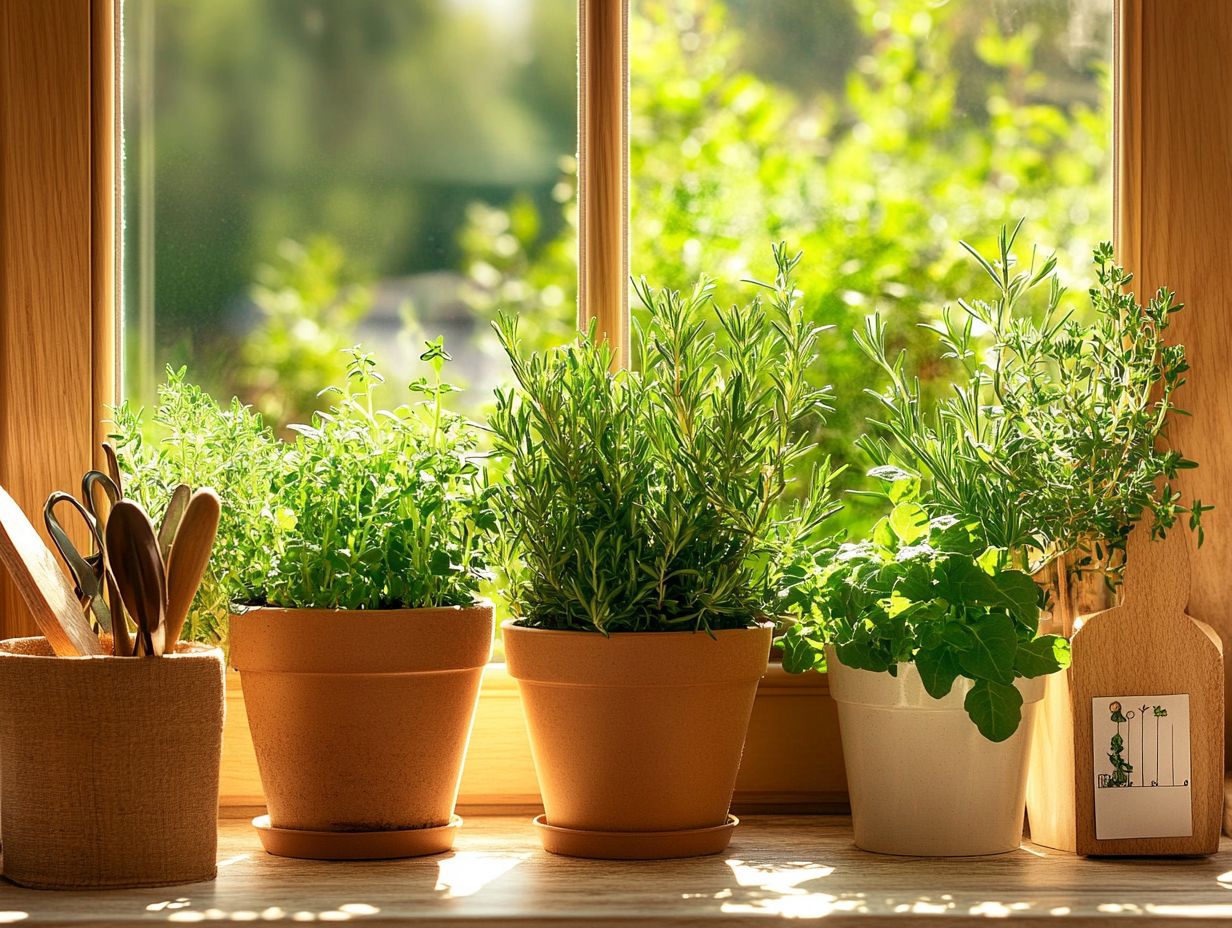
What are some popular winter herbs that can be grown successfully?
- Rosemary
- Thyme
- Sage
- Chives
- Parsley
- Cilantro
How can I start growing winter herbs?
The first step in growing winter herbs successfully is to choose a suitable location, such as a sunny windowsill or a greenhouse. Next, select the appropriate herbs based on your preferences and climate. Additionally, if you’re interested in expanding your gardening skills, you can learn how to successfully grow garlic in winter. Prepare the soil or containers, plant the herbs, and provide proper care and maintenance throughout the season.
Do winter herbs require any special care?
Winter herbs may require some additional care compared to herbs grown in warmer seasons. This includes:
- Ensuring proper drainage
- Providing sufficient light
- Monitoring temperature and moisture levels
It is also important to protect the herbs from extreme cold and harsh weather conditions.
What are some tips for maintaining winter herbs?
Regularly check the soil moisture and water only when the top inch of soil is dry. Trim and prune the herbs regularly to promote growth and prevent diseases. Fertilize every few weeks with a balanced fertilizer, and remove any dead or diseased leaves to maintain a healthy plant.
Start your own winter herb garden today!
Can winter herbs be grown indoors?
Yes! Winter herbs can thrive indoors if they get enough sunlight and care. Use pots with drainage holes or create a small herb garden on your windowsill.
Are there any herbs that do not thrive in winter?
Some herbs, like basil and coriander, struggle in the cold. It’s exciting to find the right herbs that will flourish in your winter garden!




